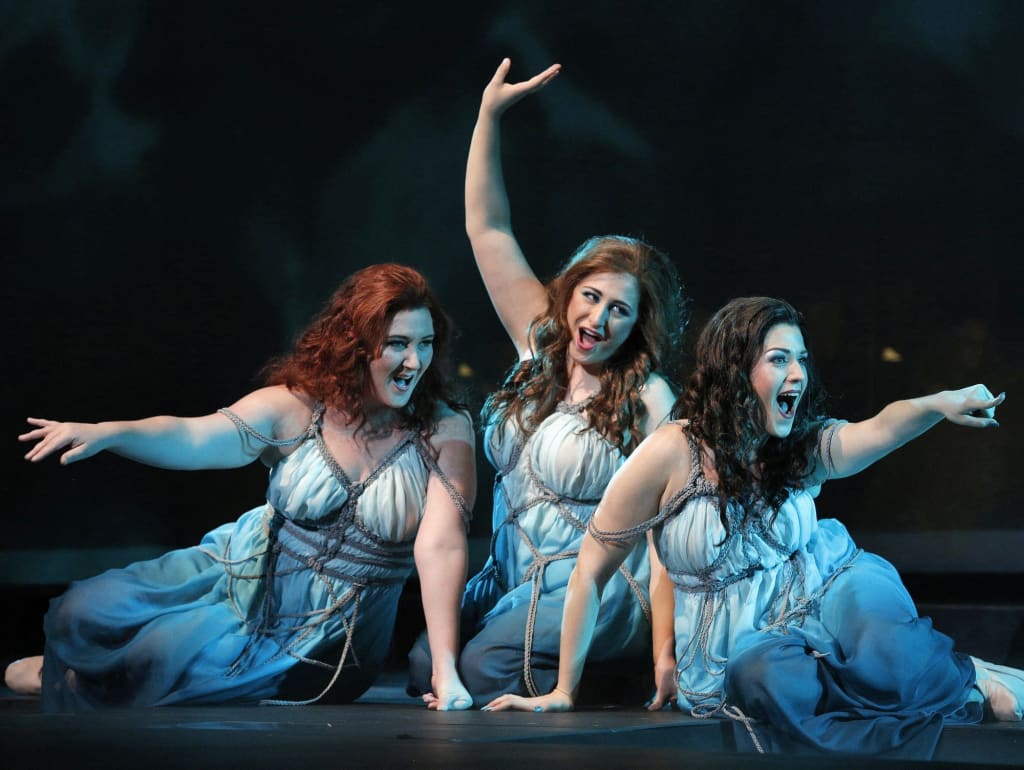Das Rheingold, by Richard Wagner
A summary of the plot

This is a summary of the plot of Richard Wagner’s scene-setting first opera of The Ring Cycle. Das Rheingold was first performed in Munich in 1869.

Das Rheingold
Das Rheingold is the first of the four operas that comprise Der Ring des Nibelungen, usually referred to as the Ring Cycle. Wagner based the story on a number of Scandinavian and Norse myths, and disentangling his sources has provided many a scholar with material for a PhD. The operas, which took 26 years to complete, are often performed separately, but the full story is only appreciated by seeing all four, although some of the necessary narrative is not presented on stage. The basic idea, of a magic ring that gives awesome power to the wearer, but which must eventually be destroyed, will be familiar to any reader of Tolkien's "The Hobbit" and "The Lord of the Rings", and the coincidence is not entirely accidental.
Act 1. The River Rhine (not on it, but in it!)
Suspension of disbelief is required right from the start, as we are on the bed of the river and the characters are still able to sing! The three Rhine-maidens guard a quantity of gold that has the power to give the owner boundless power, the only snag being that he or she must forswear love for ever. Alberich the dwarf has his eye on the gold, and he manages to trick the maidens into telling him its secret. He likes the idea of being master of the world and is not too bothered about the loss of a love life, so he steals the gold and makes off with it.
Act 2. The gardens of Valhalla, the home of the gods (a bit of a challenge for the scene shifters)
The giants Fasolt and Fafner have built Valhalla for the gods, and it is time to be paid. The deal, worked out by Loki, god of fire, with Wotan, the chief god, is that the price is Freya, the goddess of love. When the giants carry her off the flowers wither and die, the trees refuse to bear fruit, and the gods start to grow old. There is only one thing to be done, which is that the giants must be bought off with, you guessed it, the magic gold, which is now guarded by the dwarves deep underground. Wotan and Loki set off to find it.
Act 3. The cavern of the dwarves
Alberich is guarding the gold with great care. He has used some of the gold to make a ring which gives him power over both gods and men. He has also commanded Mime the smith to make him an invisible cap that enables him to assume any shape he pleases. When Wotan and Loki turn up, he boastingly shows off his powers by turning himself into, firstly, a dragon and then, at Loki's suggestion, a toad (another challenge of staging!). Loki captures the toad and refuses to release him until he has given up all his treasures, including the cap and the ring. Alberich, however, puts a curse on anyone who subsequently wears the ring.
Act 4. Valhalla
Wotan and Loki return in triumph with the treasure and summon Fasolt and Fafner to meet them. The giants bring Freya along and the gold is presented to them, although Wotan secretly hopes to keep hold of the cap and the ring. However, the giants demand these as well, and threaten to carry Freya off with them again. Wotan has no choice but to yield, but he foresees dire consequences. The curse of the ring does not take long to show itself, as the giants immediately quarrel between themselves and Fafner kills Fasolt. The opera ends with the gods crossing a rainbow bridge into their palace and the Rhine-maidens are heard lamenting their loss.

About the Creator
John Welford
I am a retired librarian, having spent most of my career in academic and industrial libraries.
I write on a number of subjects and also write stories as a member of the "Hinckley Scribblers".






Comments
There are no comments for this story
Be the first to respond and start the conversation.